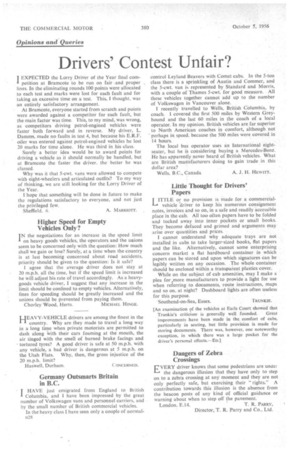Opinions and Queries
Page 68

If you've noticed an error in this article please click here to report it so we can fix it.
Drivers' Contest Unfair?
I EXPECTED the Lorry Driver of the Year final corn1 petition at Bramcote to be run on fair . and proper lines. In the eliminating rounds 100 points were allocated to each test and marks were lost for each fault and for taking an excessive time on a test. This, I thought. was an entirely satisfactory arrangement.
At Bramcote, everyone started from scratch and points were awarded against a competitor for each fault, but the main factor was time. This, to my mind, was wrong, as competitors driving petrol-engined vehicles were faster both forward and in reverse. My driver, L. Damns, made no faults in test 4, but because his E.R.F. oiler was entered against petrol-engined vehicles he lost 20 marks for time alone. He was third in his class.
Surely a better idea would be to award points for driving a vehicle as it should normally be handled, but at Bramcote the faster the driver, the better he was classed.
Why was it that 5-cwt. vans were allowed to compete with eight-wheelers and articulated outfits? To my way of thinking, we are still looking for the Lorry Driver of the Year.
I hope that something will be done in future to make the regulations satisfactory to everyone, and not just the privileged few.
Sheffield. 6 A. MARRIOTT.
Higher Speed for Empty Vehicles Only?
IN the negotiations for an increase in the speed limit 1 on heavy goods vehicles, the operators and the uaions seem to be concerned only with the question: How much shall we gain or lose? Surely, at a time when the country is at last becoming concerned about road accidents, priority should be given to the question: Is it safe?
I agree that the average driver does not stay at 20 m.p.h. all the time, but if the speed limit is increased he will adjust his rate of travel accordingly. As a heavygoods vehicle driver, I suggest that any increase in the limit should be confined to empty vehicles. Alternatively, lines for speeding should be greatly increased and the unions should be prevented from paying them.
Chorley Wood, Herts. MICHAEL HINGE.
HEAVY-VEHICLE drivers are among the finest in the country. Why are they made to travel a long way in a long time when private motorists are permitted to dash along with their cars foaming at the mouth, the air tinged with the smell of burned brake facings and tortured tyres? A good driver is safe at 50 m.p.h. with any vehicle, a bad driver is dangerous at 5 m.p.h. on the Utah Flats. Why, then, the gross injustice of the 20 m.p.h. limit?
Haswell, Durham. CONCERNED.
Germany Outsmarts Britain in B.C.
I HAVE just emigrated from England to British Columbia, and I have been impressed by the great number of Volkswagen vans and personnel carriers, and by the small number of British commercial vehicles.
In the heavy class I have seen only a couple of normalD28 control Leyland Beavers with Comet cabs. In the 5-ton class there is a sprinkling of Austin and Commer, and the 5-cwt. van is represented by Standard and Morris, with a couple of Thames 5-cwt. for good measure. All these vehicles together cannot add up to the number of Volkswagen in Vancouver alone.
I recently travelled to Wells, British Columbia, by coach. I covered the first 500 miles by Western Greyhound and the last 60 miles in the coach of a local operator. In my opinion. British vehicles are far superior to North American coaches in comfort, although not perhaps in speed, because the 500 miles were covered in 14 hours.
The local bus operator uses an International eightseater, but he is considering buying a Mercedes-Benz. He has apparently never heard of British vehicles. What are British manufacturers doing to gain trade in this dollar area?
Wells, B.C., Canada. A. J. H. HEWITT.
Little Thought for Drivers' • Papers
"ITTLE or no provision is made for a commercialvehicle -driver to keep his numerous consignment notes, invoices and so on, in a safe and readily accessible place in the cab. All too often papers have to be folded and tucked away into inner pockets or small books. They become defaced and grimed and arguments may arise over quantities and prices.
I cannot understand why adequate trays are not installed in cabs to take larger-sized books, flat papers and the like. Alternatively, cannot some enterprising concern market a flat hardboard container in which papers can be stored and upon which signatures can be legibly written on any occasion. The whole container should be enclosed within a transparent plastics cover.
While on the subject of cab amenities, may I make a plea for more manufacturers to provide a light for use when referring to documents, route instructions, maps and so on, at night? Dashboard lights are often useless for this purpose.
Southend-on-Sea, Essex. TRUNKIE.
lAn examination of the vehicles at Earls Court showed that Trunkie's criticism is generally well founded. Great improvements have been made in the comfort of cabs, particularly in seating, but little provision is made for storing documents. There was, however, one noteworthy exception, in which there was a large pocket for the driver's personal effects.—ED.]
Dangers of Zebra Crossings
EVERY driver knows that some pedestrians are under the dangerous illusion that they have only to step on to a zebra crossing at any moment and they are not only perfectly safe, but exercising their "rights." A contribution towards this illusion is the absence from the beacon posts of any kind of official guidance or warning about when to step off the pavement.
London. E.14. T. R. PARRY, Director, T. R. Parry and Co., Ltd.
















































































































